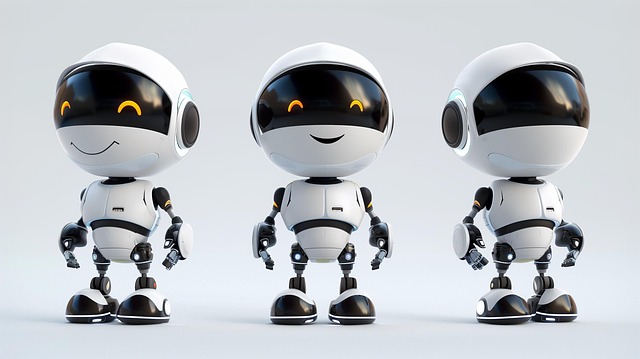Chatbots powered by artificial intelligence (chatbot AI) utilize natural language processing (NLP) to engage in human-like conversations. NLP enables machines to understand user inputs, context, and intent, enhancing chatbot accuracy and personalization. Chatbots come in three types: rule-based, hybrid, and AI-powered, each with unique capabilities for diverse applications like customer support, appointment scheduling, and personalized recommendations. Implementing chatbot AI offers advantages like 24/7 support and efficient inquiry handling, but challenges include understanding natural language nuances and maintaining contextual coherence. With continuous advancements in NLP and machine learning, chatbot AI is projected to revolutionize interactions across various sectors, becoming invaluable daily assistants.
“Chatbots powered by Natural Language Processing (NLP) are transforming human-computer interactions, offering intelligent and conversational interfaces. This article delves into the world of NLP Chatbots, providing a comprehensive guide for understanding their fundamentals and potential. We explore how NLP enhances chatbot capabilities, outlines various types tailored for diverse applications, and highlights their advantages and challenges. Furthermore, we peek into the future prospects of chatbot AI and its evolving role in natural language processing.”
- Understanding Chatbot AI: A Basic Concept
- How NLP Enhances Chatbot Functionality
- Types of NLP Chatbots and Their Applications
- Benefits and Challenges of Implementing Chatbot AI
- The Future of Chatbot AI and Natural Language Processing
Understanding Chatbot AI: A Basic Concept

Chatbots powered by artificial intelligence, or chatbot AI, are computer programs designed to engage in human-like conversations through natural language processing (NLP). They interpret and respond to user inputs using complex algorithms that analyze text, context, and intent. This technology enables machines to understand and mimic human dialogue, creating an interactive experience for users.
At their core, chatbot AI leverages machine learning models to learn from vast amounts of data, allowing them to evolve in their responses over time. They can assist with a wide range of tasks, from answering simple questions to providing complex support, making them invaluable tools in customer service, education, healthcare, and more.
How NLP Enhances Chatbot Functionality

Natural Language Processing (NLP) is a game-changer when it comes to enhancing chatbot AI functionality. By enabling machines to understand human language, NLP allows chatbots to process user queries and deliver contextually relevant responses. This means that instead of limited, predefined answers, chatbots powered by NLP can engage in more natural conversations, adapting to the nuances of human communication.
NLP brings several advantages to the table. It improves chatbot accuracy by minimizing misinterpretations, ensures better user satisfaction through personalized interactions, and facilitates the learning process for these AI assistants. With NLP, chatbots can learn from each conversation, improving their performance over time. This continuous learning ability makes them more adaptable and efficient in handling a wide range of user inquiries, making chatbot AI an indispensable tool for businesses seeking to provide excellent customer service.
Types of NLP Chatbots and Their Applications

Chatbots powered by Natural Language Processing (NLP) have evolved significantly, offering diverse interactions and applications. These chatbots can be categorized into three main types: rule-based, hybrid, and AI-powered. Rule-based chatbots adhere to pre-defined rules and scripts, making them suitable for simple, static tasks like customer support for frequently asked questions. Hybrid chatbots combine rule-based systems with machine learning algorithms, allowing them to understand and respond to a broader range of queries, especially when aided by contextual information.
AI-powered chatbots, often referred to as virtual assistants or intelligent agents, are the most advanced. They leverage deep learning models and vast datasets to learn from user interactions, continuously improving their responses over time. These chatbots can handle complex tasks such as scheduling appointments, providing personalized recommendations, and even engaging in casual conversations. Their versatility makes them applicable across various sectors, enhancing customer experience, automating processes, and offering 24/7 support through messaging platforms and voice assistants.
Benefits and Challenges of Implementing Chatbot AI

Implementing chatbot AI offers a myriad of benefits for businesses and customers alike. These virtual assistants can provide 24/7 customer support, instantly answering common queries and reducing response times. Chatbots also enhance user experiences by offering personalized interactions, tailoring recommendations based on individual preferences and behaviors. Moreover, they can handle high volumes of inquiries simultaneously, freeing up human agents to focus on more complex issues.
Despite their advantages, chatbots AI face certain challenges. One significant hurdle is the complexity of understanding natural language, as humans express themselves in varied and often nuanced ways. Developing robust conversational AI requires sophisticated natural language processing (NLP) techniques and vast amounts of training data. Additionally, maintaining contextual coherence throughout lengthy conversations remains a challenge, necessitating continuous improvements in AI algorithms.
The Future of Chatbot AI and Natural Language Processing

The future of chatbot AI and natural language processing (NLP) is poised for immense growth, promising to transform how we interact with technology in everyday life. As NLP chatbots continue to evolve, they will become increasingly sophisticated, capable of understanding nuanced human language, context, and intent. This advancement will lead to more natural and engaging conversations, enhancing user experiences across various sectors, from customer service and healthcare to education and entertainment.
With improvements in machine learning algorithms and access to vast amounts of data, chatbot AI is expected to deliver more accurate responses, adapt to individual users, and anticipate needs before they are expressed. This evolution will not only make interactions with chatbots more efficient but also foster a sense of personalization, making them invaluable tools for assisting humans in their daily tasks.
Chatbot AI has evolved significantly, driven by natural language processing (NLP), enabling machines to understand and generate human-like text. As we’ve explored, NLP enhances chatbot functionality through context comprehension, sentiment analysis, and personalized responses. From customer service to healthcare, chatbots offer numerous benefits like 24/7 availability, cost efficiency, and improved user experiences. However, challenges remain, including maintaining contextual coherence and ensuring ethical data handling. Looking ahead, the future of Chatbot AI promises even more sophisticated interactions, blurring the line between human and machine communication.
